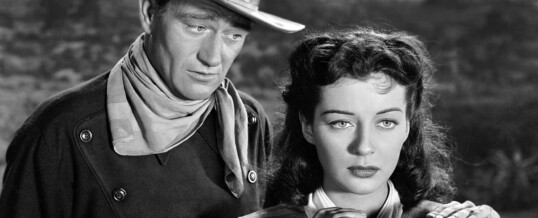
Cowboys, Kraft Dinner, and Racism
I recently had a conversation about watching old movies, specifically the John Wayne-type of westerns. In the 1970s and early 1980s you could watch a John Wayne western any Saturday afternoon on one of the two fuzzy channels we received on television in rural New Brunswick. I experience good, warm feelings when I think of these westerns, recalling memories of feeling safe, sitting on the floor in front of the television eating Kraft Dinner and buttered Saltine crackers prepared by my father. The time with my father is a good memory. Meanwhile, on the television, heroic white cowboys toted guns, rolled cigarettes, drank whiskey from a flask in a manly fashion, and rode horses through valleys of great danger to save the woman, possibly from the villainous “Indians.” During this conversation about old westerns, one person confessed his wife likes to watch them still but feels she needs to hide them from her children and grandchildren on account of the outdated and stereotypical messages around race, ethnicity, gender, and sex.
If you think about it, there is a lot going on in these nostalgic television scenarios. In one respect they represent good memories of Saturday afternoons at home with my father, but in another respect, they are set to a backdrop of racist, misogynist images and messages; images and messages that were acceptable at that time, but by most standards today, considered offensive. A couple of years ago I encountered one man who told me he allowed his small children to ONLY watch these westerns (and similar movies) because they were wholesome and more aligned with what he considered to be traditional Christian values of the 1950s and 1960s. It was his way of trying to protect his children from what he saw as the evils of a secular world.
For me, these examples raise a couple of questions.
First question, is it possible to have good feelings connected to something that was problematic all the time and I just did not know it?
In my experience, I think we do it all the time. I tell the story about the Saturday afternoon westerns not as an indictment of the time or of my parents and what they allowed me to watch on television. We always see things more clearly in the rear-view mirror. I tell the story because at times I think it is tempting to do this with the Church of our past. I think it is natural for me to want to return to a place of safety and comfort, when the world seemed simpler, but unfortunately it is not possible for me to do this if I am trying to grow in my faith. While we have much to learn from our past, we cannot grow into the past, but out of the past. Through the grace of God alone, we have developed a more complex understanding of God, Jesus Christ, one another, our lives, the world, and all of creation. Trying to view the beautiful complexities, contradictions and mysteries of God working in our lives through the lens of another time will not lead us to a place of growth.
Second question, can I compartmentalize my life into sacred and secular areas?
I think that while it might be tempting to do so, I have not found it to be helpful. To be perfectly honest, I do not spend a waking moment separating my life and the rest of the world into “sacred” and “secular”. Fr. Richard Rohr, OFM says that everything is sacred if we know how to see. He writes:
Almost every religion’s history begins with one massive misperception; namely, making a fatal distinction between the sacred and the profane. Religions often put all their emphasis on creating sacred places, sacred time, and sacred actions. While I fully appreciate the need for this, it unfortunately leaves most of life “un-sacred.
I have learned that black and white assertions are largely unhelpful and gloss over the meaningful messages God communicates to us in ways we have not even considered possible. Jesuit priest Fr. John Foley questions whether we are not in fact placed in the world…
…to be holy in it, to be friends with the things of Caesar? To work in the world of sin in spite of our own sins? … What if, in spite of the voices within you that say you are not worth much, in spite of the setbacks of life, the losses, the flatness, in spite of all these, what if God created you with room inside you where God, out of love for you, can be quietly present?
As one priest reminds us often, God is at work constantly even through painful, difficult situations where we feel certain God is absent. Several years ago I attended a catechetical conference in Corner Brook, Newfoundland, where Sr. Janet Schaeffler, OP was the keynote speaker. She was a brilliant facilitator, filled with hope and enthusiasm for the future of our Church, but one quote (paraphrased) stood out for me above all others, and I return to this often in my own prayer and reflection:
“If all you see around you is evil and a world with problems that need to be fixed, then you are the one that needs fixing.”
If the first or only thing I see about you are your flaws and what is wrong with you, I am the one who needs fixing.
~Trevor Droesbeck, Office for Evangelization and Catechesis
Archdiocese of Moncton
OCT
2023

About the Author: